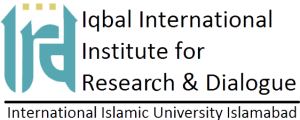International Seminar on Combating Islamophobia: Challenges and the Way Forward for the Muslim World
20 March 2023
The Iqbal International Institute for Research and Dialogue, in collaboration with Department of Media and Communication Studies and Department of Sociology IIUI organized an International Seminar on Combating Islamophobia:
Challenges and the Way Forward for the Muslim World. Speaking at the seminar Chief Guest Minister for Religious Affairs Mufti Abdul Shakoor said that the best way for the Muslim world to combat Islamophobia is to gain economic independency. Most Muslim nations are heavily dependent economically either on the US, European Union, China or Russia. In terms of education especially in the field of science and technology, the contribution of Muslim countries is practically non-existent. This is one of the major reasons for their lagging behind. They must make advancement in science and technology to gain respect in this globalized world so that their voices are heard. Panelists of the seminar included renowned Professor Dr Zafar Iqbal, Dean Faculty of Social Sciences, IIUI Professor Dr Khalid Masood, Renowned Scholar, Former Chairman Council of Islamic Ideology, Dr Sami Al-Arian, Director of the Centre for Islam and Global Affairs (CIGA) at Istanbul Zaim University, Dr Noor Fatima, Department of Politics & IR, IIUI, Prof John L Esposito, Georgetown University Washington and Prof Junaid Ahmad, William and Marry College, Director, Centre for the Study of Islam and Decoloniality. The panelists were of the opinion that specific elements are behind negative propagation of Islam and they disseminate misperceptions about it. Some of the groups can play critical role in combating islamophobia included well-intentioned Westerners, who knew that hatred bred hatred; honest Western scholars, whose voices must be heard; and Muslims themselves, who must try to bridge the gap between Islam and the West. They suggested that the leaders of the Muslim world must design a strategy to combat Islamophobia. The academic and scholarly circles of the Muslim world should also explore its roots from epistemological and historical perspectives, outlining the political and cultural factors contributing to its rise and then recommend strategies to combat it.
